Local Member Bundle
Congratulations, you’ve chosen our local membership bundle for:
Featured Items
We talk to the experts about what to do to stay calm and carry on...

These last few weeks have been rather unusual, haven’t they? It’s nearly six weeks since it was announced that the schools were closing. Anxiety levels across the nation suddenly peaked as we all found ourselves glued to our phones, laptops and TV screens.
At first, we thought social distancing and self-isolation might just last until after the Easter holidays, but we soon learned to stop guessing, stop moving the goalposts, and just wait to see how things panned out. Meanwhile, our moods continued to swing this way and that as words like “unprecedented” became part of our everyday language.
Most of us have experienced some level of anxiety at some point in our lives, whether it was due to life changes, exams, social stress or bigger issues that might be completely out of our control, like climate change… or a global pandemic.
One person who knows what it’s like to face her fears is Caroline Foran, author of the bestselling guide to living with anxiety, Owning It. Through her books and podcast, she has shared her own story to help others discover the tools to help them cope. “My advice to anyone experiencing anxiety right now, whether it’s something they’ve felt before or an entirely new feeling, is to take some time to educate yourself on precisely what anxiety is, how it happens and why it makes sense,” says the Irish author, whose third book, Naked: Ten Truths to Change Your Life (Hachette Ireland), is due out this summer.
“There’s no point in trying to reduce the anxiety if you don’t first understand why it’s there, and right now there are a lot of vulnerability factors at play.”
“Anxiety is something we feel when there is a sense of threat to our physical or emotional survival, when we feel out of control, when our thoughts are future-oriented, and when we feel that, we don’t have the resources within us individually to manage the stressors we’re facing. With the pandemic, you’re ticking all of those boxes and then some. Accept the presence of anxiety – it’s not doing you any harm, it’s trying to protect you. Don’t try to not feel it; allow for it, be compassionate with yourself about the fact that you’re feeling it, and then do whatever you can do that helps to bring down that stress response.
“It doesn’t have to be meditation, it can be watching something funny on Netflix. The more time you spend doing things that make you feel a little more at ease, the more you will bring down your anxiety levels overall. In my first book, Owning It, I offer a two-pronged coping mechanism called ‘The Assess and Address’ approach, which I find very effective even for myself these days when it comes to managing anxiety.
“Self-isolating and social distancing can certainly make managing anxiety that bit harder,” admits Foran, “but the same resources I would have turned to are still there. There has never been more information readily available to help you manage your anxiety, but it can become a little overwhelming with the amount of choice, so I would find a voice or a source that you find helpful and narrow your focus onto that person’s work/writing/podcasts, etc.”
Caroline warns that there are no quick fixes: “Trying to cure anxiety, trying to run away from it, trying to snap out of it, being hard on yourself and hoping the self-criticism will push you out of the anxiety cycle… This will not work. Self-criticism will keep you feeling anxious because it further stimulates the stress response and in particular, cortisol production. What works is a more gentle approach, understanding it, owning it, becoming friends with it and being self-compassionate at every turn. Self-compassion has been proven to down-regulate the stress response. Then in terms of things to try, it’s really a case of whatever works for you, as long as it’s not harmful to you.”
One simple exercise you can do, according to Mary McHugh, a qualified psychotherapist with over 20 years’ experience in counselling, and co-founder of the Irish Online Psychotherapy and Counselling Service (IOCPS, counsellingonline.ie), is to “come to your senses”, by which she means to tap into your five senses: taste, touch, smell, sight, and hearing.
“Take some time to focus on your breath. Listen to the sound, follow your breath and say to yourself, as you’re breathing, ‘I am breathing in, I am breathing out.’
We cannot think two thoughts at the same time, so when I’m saying, ‘I am breathing in’, nothing else is coming into my thoughts. Also, if we breathe in through our noses and breathe out slowly through our mouths, that settles down the vagus nerve, which is responsible for the fight or flight response.
“It’s actually quite normal to be frightened and filled with anxiety right now,” advises McHugh, “because we have no idea, if we get Covid-19, how it’s going to affect us, and that brings in fear, which activates our amygdala [located in each cerebral hemisphere, the amygdala is responsible for the perception of emotions]. So we’re on edge as we are, and then any other additions to that are going to stir it up all the more. So things that you would have taken in your stride before now become maybe more anxiety-provoking.
“It’s important to exercise, have boundaries, and ask for your needs to be met. Establish a routine. As if you’re going to work, get up at a certain time, have your breakfast at a certain time, your lunch… Try and get off social media because all you’re doing is adding more anxiety on top of anxiety, and it’s just heightening it – just take a break away from it.”
Having lived with long-term anxiety for years, and now pregnant with her first child, how has Caroline been feeling since the lockdown began? “I think my personal experience with anxiety and how much I have come to understand it has made this a lot easier for me. I definitely feel it, but I know that it makes complete sense and I’m well aware of those vulnerability factors at play. I can imagine how this would have impacted me a few years ago, and it would have been a disaster.
“I cannot stress enough how important it is to really understand the mind and body and how that in itself reduces the anxiety. I’ve had some wobbles where I’ve gotten upset or felt a bit lost at sea, and I allow for that, I honour the feeling, whatever it is, I label it and say, ‘Okay, there you are’, and I talk it through with my husband or a friend or my mum on FaceTime, and I usually find it settles down again within a day or two.
“I have been most worried about my financial situation, as pretty much all of my income that I was relying on over the coming months has been wiped, and I let myself wallow in that (I never try to force positivity on myself if it’s not authentic); and then once I got used to the idea, I mapped out the financial practicalities with my husband and dusted myself off. We always underestimate our ability to adapt to whatever challenges we are presented with. I am sure that more anxious times are ahead of me as I approach labour – and I can’t avoid that – but it’s okay to feel anxious about that. It’s okay to feel anxious in any situation because it’s relative to you, your context, your life, and don’t let anyone tell you otherwise.”
Here are a few resources that might help…
Many therapists across the country now offer online counselling sessions, including the Irish Online Psychotherapy and Counselling Service (IOCPS, counsellingonline.ie), which was co-founded in 2011 by Mary McHugh and Donijka Monk. McHugh says she’s seen an uptake in demand for online counselling since the lockdown, the reasons for which are twofold: that people cannot see a therapist in person due to current restrictions, and that they’re experiencing an increase in feelings of anxiety. However, since the IOCPS was established, McHugh has also discovered that online counselling actually works better for some patients than in-person sessions, especially when a patient is more comfortable and open via video than they would be in a therapist’s office. “We established the IOCPS as we knew some people were being left behind as they were unable to access face to face sessions for whatever reason, whether that be logistics or social anxiety or fears. Video counselling doesn’t suit everybody, but it does suit quite a lot of people, and for the majority, an online session is no different to one in person. Plus, you can access it at a time that suits you from the comfort of your home, office, even your car. I can definitely see online counselling becoming the way of the future after the lockdown.”
What can you expect from online counselling? According to McHugh, “People go into counselling because they’ve lost their power in whatever it is, whether that’s their relationship, their job, life – they just feel a loss. You take the first step in taking your power back, and that’s by choosing who you want to work with, so our website features profiles of all our therapists to choose from. Then, you decide how you want to work with them – we offer instant chat, telephone or video, so you choose what medium works for you. The only thing we don’t do is email, because we work in the present moment. Then you choose your time and pay for your session – in that regard, it’s just like ringing up to make an appointment.”
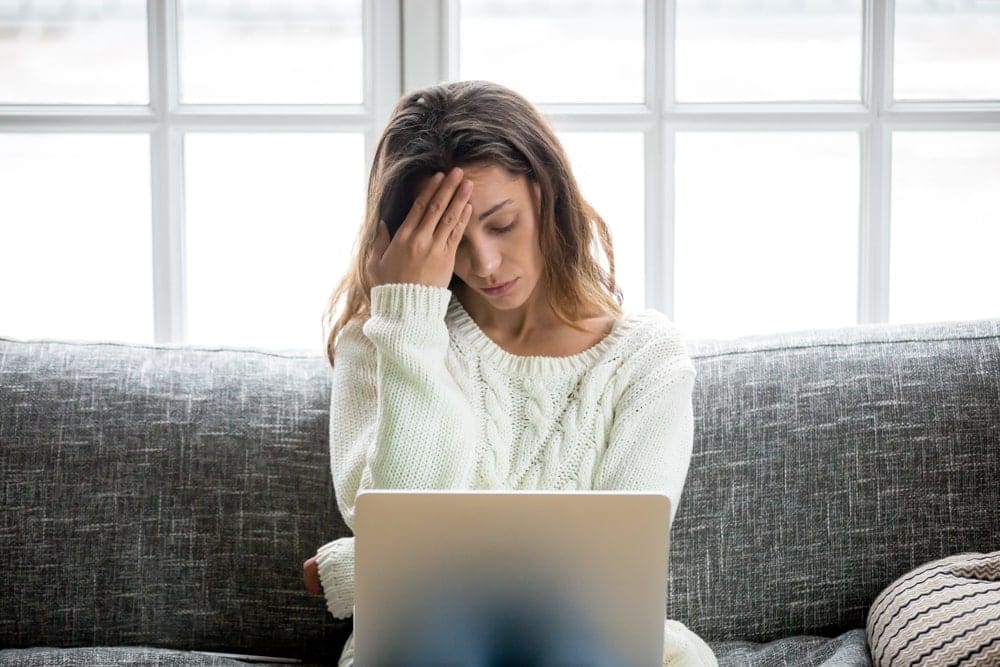
Caroline Foran shares her own story and explores the ins and outs of what anxiety is and the tried and tested tools that have been shown to help people cope via her podcast, Owning It: The Anxiety Podcast. Have a listen while you cook dinner or head out for your daily walk.
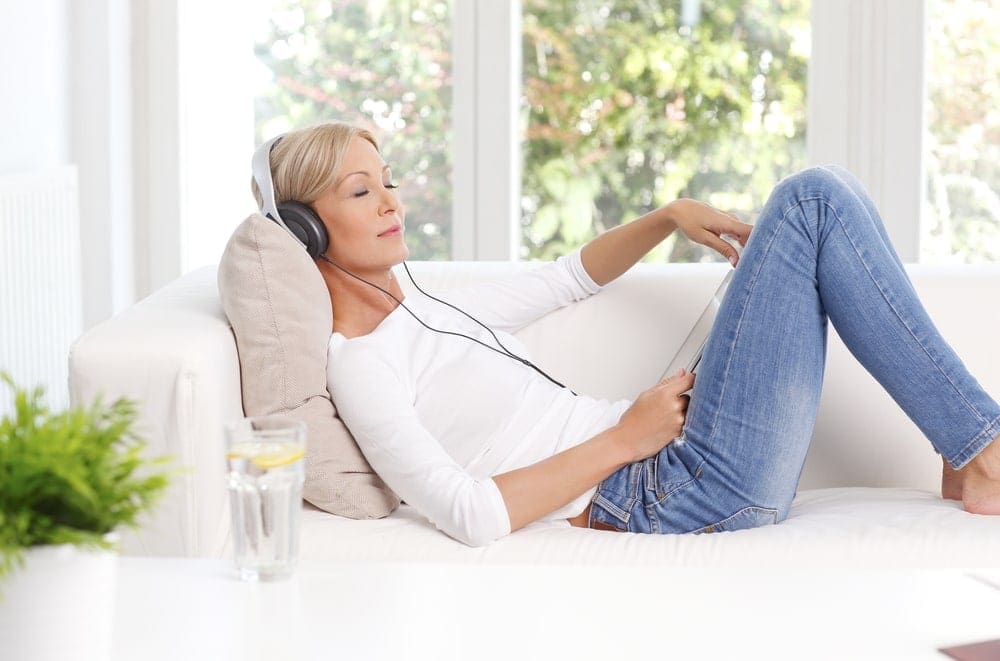
“I would also recommend cognitive behavioural therapy (CBT),” says Foran. “You can engage in CBT yourself by downloading some free exercise worksheets online, and there are plenty of them in my book and peppered throughout my podcast.”
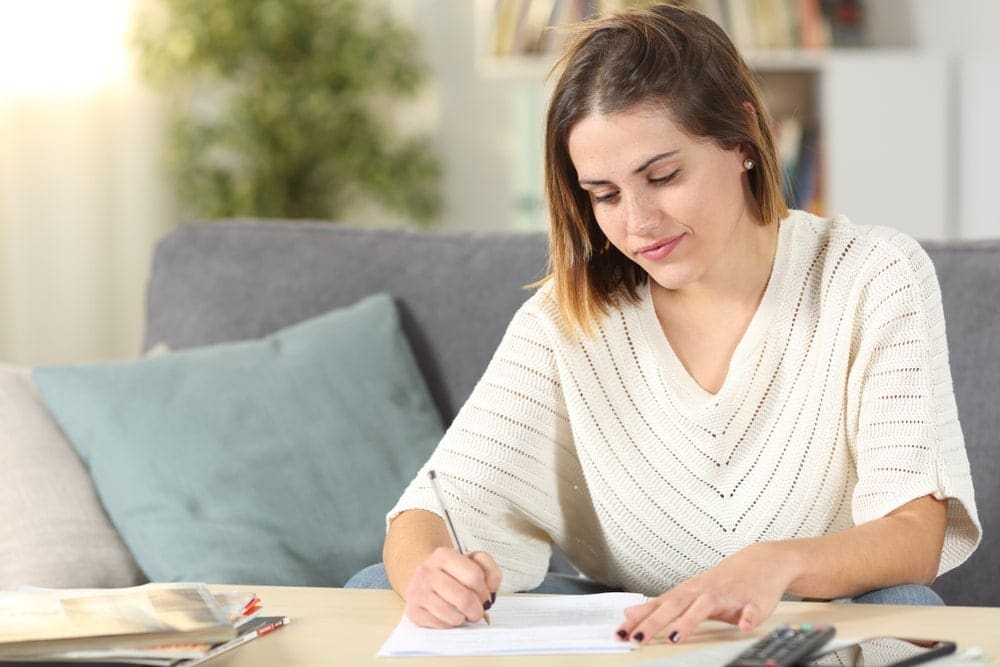
There is a wealth of apps out there – like Headspace, Rootd and Calm – that help alleviate anxiety and stress. Give a few a try and see what works for you.
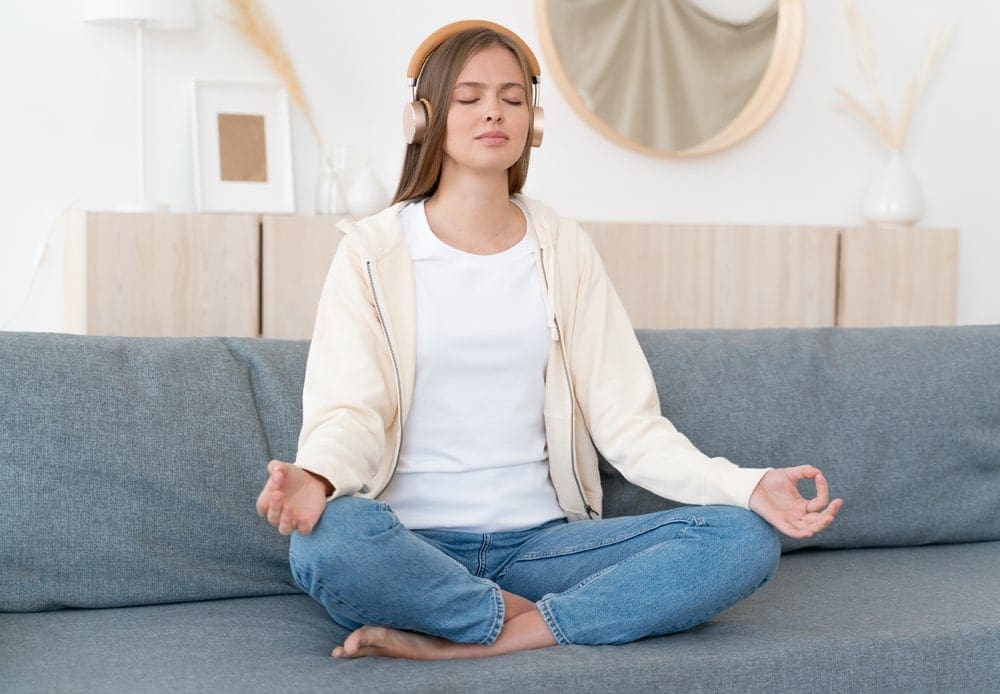
As McHugh advises, take some time to focus on your breath and be in the present moment. Breathe in slowly through your nose, and then slowly out through your mouth. To help you focus, use your thumb to tap the tip of each finger on the same hand for each breath cycle – so your index finger for the first in and out breath, then your middle for the second, etc. When you get to your pinkie, return to your ring finger to get back to your forefinger. Then return to normal breathing and notice how much softer it feels.
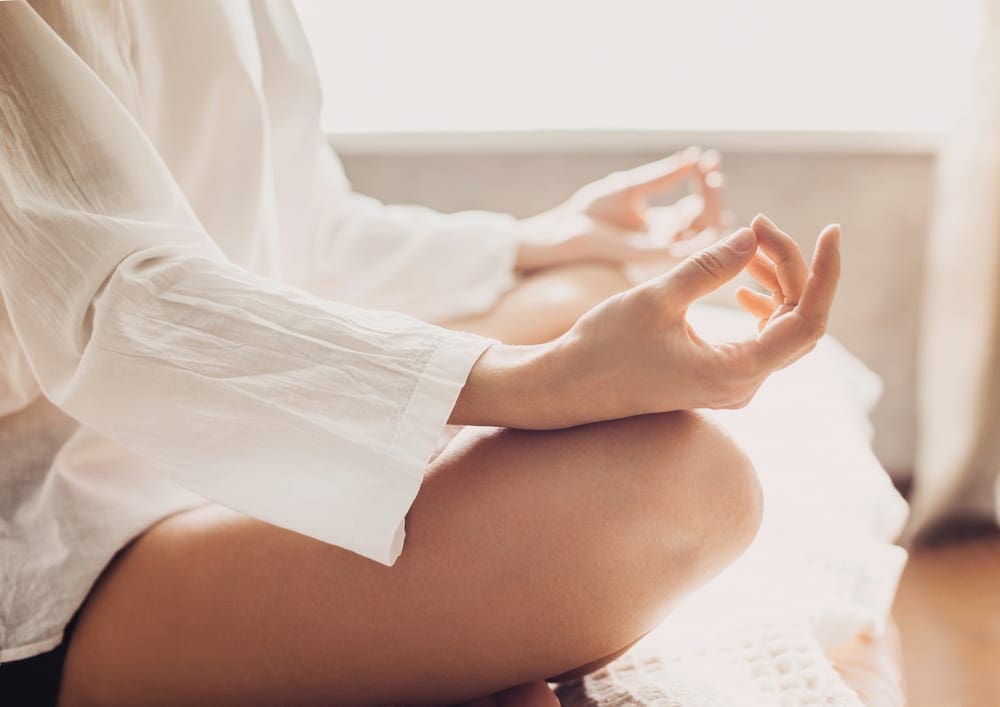
If you’re finding your sleep patterns are all over the place, you’re not alone. Broken nights and crazy dreams have been reported and shared on social media throughout the lockdown. Don’t fret about it or let insomnia or disrupted sleep cause you further anxiety. Head up to bed early one night (be sure to do this on a night you’re not drinking, as alcohol can further disrupt your sleep), have a long bath, read a book, and stay off screens. If you need a little extra help, try a virtual sound bath – this is a relaxation technique where you’re “bathed” in sounds and vibrations created using Tibetan bowls, gongs and other instruments. There are plenty available on YouTube, so see which is the most soothing to you and look for one that lasts more than 20-30 minutes. Dim the screen on your phone, laptop or iPad to be sure the light doesn’t interfere with the darkness of your room (the blue light emitted from screens can delay the release of sleep-inducing melatonin and increase alertness) and listen at a low volume to help you drift off into a deep sleep.

Drop A Dress Size
6 Week Challenge
Join now!
For assistance, please contact our support team. Thank you.



Congratulations, you’ve chosen our local membership bundle for:



Congratulations, you’ve chosen our online only membership bundle for:



Congratulations, you’ve chosen our online membership bundle for: